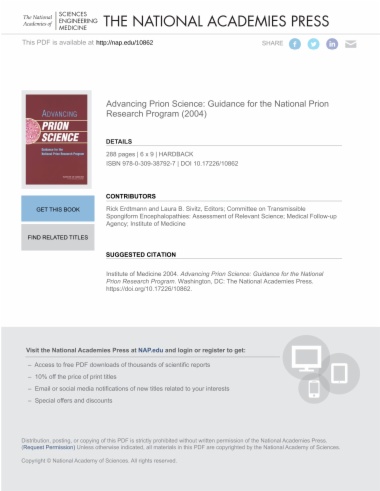In Advancing Prion Science, the Institute of Medicine's Committee on Transmissible
Spongiform Encephalopathies Assessment of Relevant Science recommends priorities
for research and investment to the Department of Defense's National Prion Research
Program (NPRP). Transmissible spongiform encephalopathies (TSEs), also called prion
diseases, are invariably fatal neurodegenerative infectious diseases that include
bovine spongiform encephalopathy (commonly called mad cow disease), chronic
wasting disease, scrapie, and Creutzfeldt-Jakob disease. To develop antemortem
diagnostics or therapies for TSEs, the committee concludes that NPRP should invest
in basic research specifically to elucidate the structural features of prions, the molecular
mechanisms of prion replication, the mechanisms of TSE pathogenesis, and the
physiological function of prions' normal cellular isoform. Advancing Prion Science provides
the first comprehensive reference on present knowledge about all aspects of
TSEs—from basic science to the U.S. research infrastructure, from diagnostics to surveillance,
and from prevention to treatment.
- Cover
- Front Matter
- Executive Summary
- Summary
- 1 Introduction
- 2 Prion Diseases: An Overview
- 3 Basic Biomedical Research on Transmissible Spongiform Encephalopathies
- 4 Diagnostics for Transmissible Spongiform Encephalopathies
- 5 Testing Blood for Evidence of Agents of Transmissible Spongiform Encephalopathies
- 6 Surveillance for Transmissible Spongiform Encephalopathies in the United States
- 7 Assessment of Strategies to Prevent and Treat Transmissible Spongiform Encephalopathies
- 8 Infrastructure for Research on Transmissible Spongiform Encephalopathies
- 9 Risks of Transmissible Spongiform Encephalopathies to the U.S. Military
- Appendix A: Agendas of Open Sessions of Committee Meetings
- Appendix B: Biographical Sketches
- Glossary
- Color Plates

